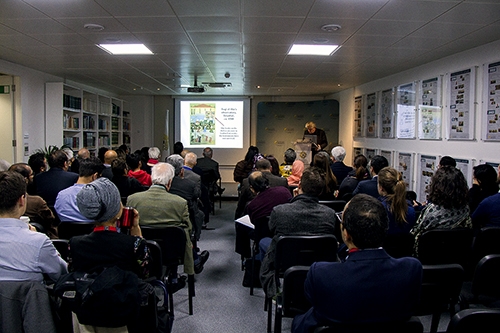
As part of the Al-Furqān Islamic Heritage Foundation’s seasonal lecture series, the Centre for the Study of the Manuscripts at Al-Furqān Islamic Heritage Foundation (London), organised a public lecture on Wednesday, 7 March 2018. This was titled “Astronomy in the Service of Islam”, and was hosted at the lecture theatre in Al-Furqān’s London headquarters. The lecturer was Professor David A. King, Emeritus Professor of the History of Science at the J.W. Goethe University, Frankfurt.
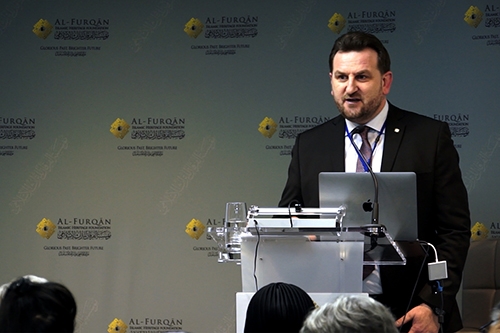
Mr Sali Shahsivari, Director of the Al-Furqān Islamic Heritage Foundation, opened the evening by welcoming and thanking the guests and introducing the lecture and the lecturer. He drew attention to the long-standing interest at the Al-Furqān Foundation in the study of manuscripts and the importance of the lecture topic. Mr Shahsivari then introduced the speaker, Professor King, as a British-born orientalist who has dedicated his life to the study of both “folk” and “mathematical” astronomy in Islamic civilisation, and whose research interests lie predominantly in the field of medieval Arabic/Islamic manuscripts and instruments. His major publications were mentioned, including the book on Mecca-centred world-maps whose publication Al-Furqān had undertaken.
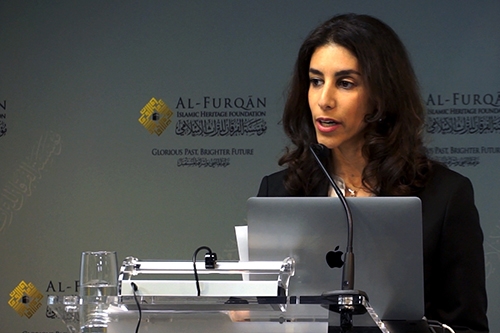
Subsequently, Mrs Sara Yamani, Member of Yamani Cultural and Charitable Trust (YCCT), spoke on behalf of Al-Furqān Islamic Heritage Foundation, and its Chairman and founder, H.E. Shaykh Ahmad Zaki Yamani. She welcomed the guests and the lecturer and pointed out that the lecture was one of over sixty that the Foundation had organized, all of which “aims at strengthening links with those interested in Islamic heritage and to raise awareness about the richness of this heritage.” She highlighted that Professor King’s lecture will be on a “cornerstone of Islamic heritage, tradition and studies, namely the field of astronomy.” The importance of astronomy to the Islamicate world and to Muslims, in particular, is reflected in the aspects of religious practice, such as determining the of the qibla, the lunar calendar, and the times of salah. She expressed her pleasure at hosting Professor King, “a world-renowned authority in this field and an old friend of Al-Furqān”.
Professor David King commenced his lecture by drawing a distinction between folk astronomy, a form that was favoured by the Muslim legal scholars, “that which we see in the heavens with the naked eye” otherwise known today as ʿilm al-falak al-taqlīdī, and mathematical astronomy. These fuqahāʾ also favoured a sacred cosmology (al-hayʾa al-sunniyya) based on the Qurān and the ḥadīth. What these jurists proposed, inevitably, was different to what the astronomers proposed, Professor King stated. He mentioned that much of the written tradition on astronomy began in Medīnat al-Salām (The City of Peace), Baghdad, which between the 9th and 10th centuries was the most civilised city on earth and that the Baghdadian libraries would contain books on the entire spectrum of learning, upon which Professor King displayed some images of such manuscripts that were stocked in the library. Professor King then drew attention to the Fihrist of the 10th-century scholar Ibn al-Nadīm and the list of Arabic works on astronomy that it contains. Ibn al-Nadīm was interested in instrument-makers as well as authors: no less than thirty such craftsmen were known to Ibn al-Nadīm in the Baghdad at the time, and over a dozen of their astrolabes have survived and been studied. Of all the texts and instruments which existed, Professor King said that during the lecture he will be focusing only on those relating to three aspects of astronomy, namely the organisation of the lunar calendar and religious festivals; the “sacred direction” and orientation of the mosques; and the regulation of the of the five daily prayers “whose times are astronomically defined.” It is this important, albeit small, chapter in the history of Islamic astronomy that Professor King refers to as “astronomy in the service of Islam.”
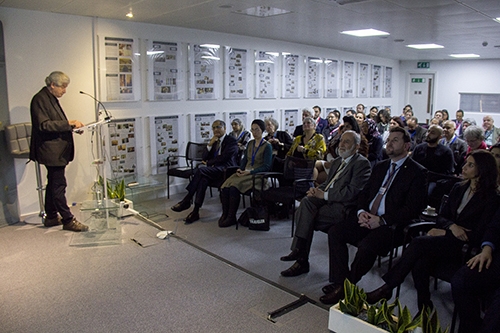
Professor King began with the regulation of the lunar calendar, showing an illustration of a miniature of the astronomer Taqī al-Dīn, observing a comet on the first night of the new moon of Ramadan, 1577. While legal scholars, in general, were happy to rely on witnesses who saw the crescent – a skill that was in a much better state in pre-modern times – the astronomers, however, saw the determining of the sighting of the new lunar months was seen as a complicated problem. The attendees were presented with a series of calculations and tables demonstrating the extent and ingenuity of Muslim scholars who explored these issues, beginning with that of al-Khawarizmi who made invaluable contributions to the field of astronomy, over and beyond his known contributions to algebra. The audience was informed that al-Khawarizmi, often presumed to be a central Asian scholar was in fact originally from Qutrubullī, just outside Baghdad.
Professor King underscored that the achievement of Muslim astronomers is nothing short of impressive, marvelling that scholars have still not grasped how some elements of astronomical science were discovered. Then turning to the “qibla problem”, the audience were told it was solved because astronomers knew that the rectangular base of the qibla “was aligned in certain significant astronomical directions.” Professor King displayed images of two (of twenty) different schemes of Islamic sacred geography, after which he tackled the questions of why mosques – in Cordoba, Cairo and Samarqand, among others – were oriented in ways that do not necessarily concord with modern orientations towards the qibla. All these mosques faced the qibla, Professor King asserted. Supporting legal texts were provided, in addition to a rare example of a mosque (in Wasit, Iraq) being demolished and replaced with a new mosque with a correct orientation.
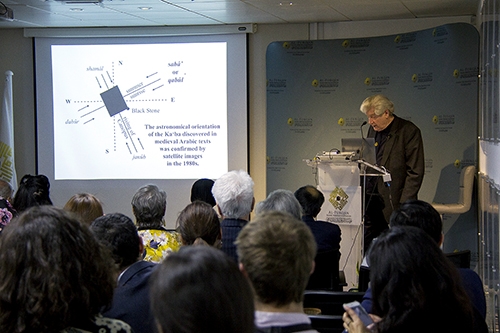
On the third aspect, that of times of the five daily prayers, Professor King commented on the various arithmetical schemes found in handbooks and on simple shadow observations, briefly comparing the two methods, while displaying a series of prayer timetables from different periods and regions of the Muslim world
The lecture ended on the importance of reawakening interest in matters pertaining to Muslim contributions to astronomy and to appreciate Muslim achievement in this area. Much further work remains to be done. The lecture was concluded with a brief question and answer session.

